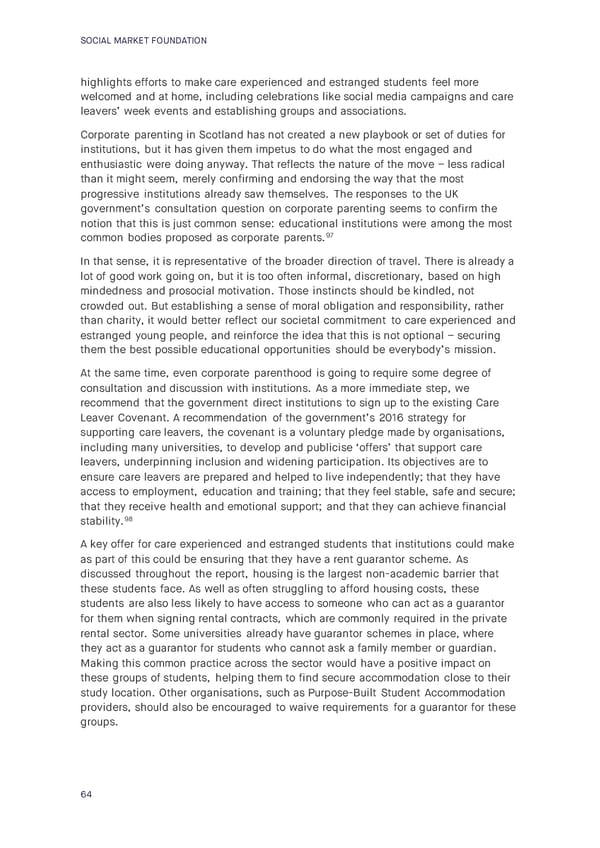SOCIAL MARKET FOUNDATION highlights efforts to make care experienced and estranged students feel more welcomed and at home, including celebrations like social media campaigns and care leavers’ week events and establishing groups and associations. Corporate parenting in Scotland has not created a new playbook or set of duties for institutions, but it has given them impetus to do what the most engaged and enthusiastic were doing anyway. That reflects the nature of the move – less radical than it might seem, merely confirming and endorsing the way that the most progressive institutions already saw themselves. The responses to the UK government’s consultation question on corporate parenting seems to confirm the notion that this is just common sense: educational institutions were among the most common bodies proposed as corporate parents.97 In that sense, it is representative of the broader direction of travel. There is already a lot of good work going on, but it is too often informal, discretionary, based on high mindedness and prosocial motivation. Those instincts should be kindled, not crowded out. But establishing a sense of moral obligation and responsibility, rather than charity, it would better reflect our societal commitment to care experienced and estranged young people, and reinforce the idea that this is not optional – securing them the best possible educational opportunities should be everybody’s mission. At the same time, even corporate parenthood is going to require some degree of consultation and discussion with institutions. As a more immediate step, we recommend that the government direct institutions to sign up to the existing Care Leaver Covenant. A recommendation of the government’s 2016 strategy for supporting care leavers, the covenant is a voluntary pledge made by organisations, including many universities, to develop and publicise ‘offers’ that support care leavers, underpinning inclusion and widening participation. Its objectives are to ensure care leavers are prepared and helped to live independently; that they have access to employment, education and training; that they feel stable, safe and secure; that they receive health and emotional support; and that they can achieve financial stability.98 A key offer for care experienced and estranged students that institutions could make as part of this could be ensuring that they have a rent guarantor scheme. As discussed throughout the report, housing is the largest non-academic barrier that these students face. As well as often struggling to afford housing costs, these students are also less likely to have access to someone who can act as a guarantor for them when signing rental contracts, which are commonly required in the private rental sector. Some universities already have guarantor schemes in place, where they act as a guarantor for students who cannot ask a family member or guardian. Making this common practice across the sector would have a positive impact on these groups of students, helping them to find secure accommodation close to their study location. Other organisations, such as Purpose-Built Student Accommodation providers, should also be encouraged to waive requirements for a guarantor for these groups. 64
 Care and Learning in Higher Education Page 64 Page 66
Care and Learning in Higher Education Page 64 Page 66